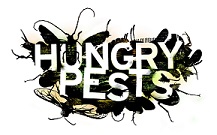Classroom Resources for Preschool and K-12 Educators
Reducing children’s exposure to pesticides is a shared goal for all pesticide safety educators. There’s a web of information available on the internet related to pests, pesticides and pest management techniques. As an educator, sorting through these resources can be time consuming and tiring. Reducing the impact of pesticides on children can be accomplished by educating children and their families about pests and how they are controlled through what is known as integrated pest management or IPM. In essence, IPM is a set of pest management practices that when applied together reduce or eliminate the need for pesticides. These practices are based on the understanding of a pest’s biology and life cycle. In addition to proper pest identification, IPM practices may include habitat modification, sanitation, or for pests that find ways into buildings, exclusion. IPM is discussed in further detail under the Homeowner section of this website.
In addition to the information found throughout the Virginia Pesticide Safety Website, the following resources can be valuable training aids when discussing pest management and pesticide safety topics in the classroom. Although most of the resources were developed to meet the standards of learning in other states, they should be adaptable to Virginia's standards of learning for subjects such as health or science, particularly environmental sciences. You may find additional activities to use in the classroom in the KIDS ONLY! section of this website as well.
Encourage integrated pest management practices in your school. To learn more about IPM and how it can be implemented in your school visit either of the following websites:
Integrated Pest Management Guidelines for Virginia Schools (Virginia Department of Education)
Virginia School IPM (Virginia Tech)
Managing Pests in Schools (Environmental Protection Agency)
Curriculum:
Bed Bugs and Book Bags: School Enrichment Curriculum for Grades 3-5 -This curriculum was developed by the University of Florida/ IFAS Extension in collaboration with the Jacksonville Bed Bug Task Force. Before the curriculum can be downloaded, teachers are required to view an online training presentation and take a brief quiz. The training takes about 30 minutes to complete.
Beth’s Quest Curriculum –Several grade specific curricula designed to teach about Lyme disease.
Don’t Let the Ticks Bite –Curriculum Guide for Teachers. This guide was developed by the California Department of Public Health but can be adapted and used by teachers in other states. The curriculum is designed for grades 4-6.
Elementary Guest Entomologists & Newly Trained Scientists (eGENTS)-Interactive curriculum designed for grades 3-5 which discusses Biological Control of insect pests. There is a downloadable Student activity book and online games that can be used in conjunction with the lessons.
Georgia Pest Module -Curricula compiled on the website of the Garden Earth Naturalist Club.
Hungry Pest Educator Tools-The United States Department of Agriculture, Animal and Plant Health Inspection Service has developed curricula designed to make youth aware of invasive species and the damage they cause. The tools include Summer Camp Activities, emerald ash borer activities (Stop the Beetle: Now!) and a video starring Vin Vasive.
Pesticide Safety: Preschool Curriculum –This curriculum was developed through grants from the NIEHS and US EPA to educate preschoolers about pesticides and their associated risks. (English/Spanish Curriculum)
Pesticide Safety: Elementary School Curriculum –This curriculum was developed through grants from the NIEHS and US EPA to educate elementary students about pesticides and their associated risks. (English/Spanish Curriculum)
MSU IPM Curriculum K-6 - This curriculum was developed by the Michigan State University Pesticide Safety Education program to teach elementary students about the concepts of IPM through hands on activities, work sheets and other activities.
Maine’s K-12 IPM Education Curricula –An assortment of IPM related curricula for use in the classroom. The curricula are grouped by grade or subject.
Hydroville Curriculum Project –This online curricula provides students with different environmental health problems, including a pesticide spill, that they can research and remediate. It was developed by the Environmental Health Sciences Center at Oregon State University.
Agricultural Aviation Curriculum Guides –These guides were created by the National Agricultural Aviation Association to introduce the agricultural aviation industry to educators and students. There are two guides available, an elementary (K-5) and secondary (6-12).
Fundamentals of Lyme Disease Prevention –These teacher resources from the Global Lyme Alliance discuss Lyme disease, its spread through ticks and prevention.
Individual Lessons and Activities:
Lessons from Labels (Penn State Extension)- Lesson utilizes actual product labels to teach students about integrated pest management, types of pesticides, selecting pesticides, pesticide toxicity and other related activities.
Acute Toxicity: LD50 by the Numbers (Penn State Extension) -Lesson helps students learn about pesticide toxicity and how it helps determine risks.
Teaching Aids & Activities:
EPA Student and Teacher Resources –The Environmental Protection Agency (EPA) has developed several educational resources such as coloring and activity books, interactive websites and posters that can be used by educators. Hardcopies of some materials on EPA's site can be ordered by teachers for distribution to students.
Pesticide Education Bingo (Penn State)–Help students learn about pesticides with through a game of Bingo.
APS Education Center –Resource site developed by the American Phytopathological Society for teachers interested in teaching about plant pathology (plant diseases). The site includes lists of programs and workshops as well as lessons and laboratory experiments.
Pestworld for Kids –A website developed by the National Pest Management Association to teach kids about insect pests and integrated pest management.
Tox Town –Developed by the National Library of Medicine, this website has general information about pesticides, exposure and how pesticides and other chemicals and contaminants affect human health. The site has links to interactive communities to illustrate where people are exposed to various toxic chemicals, including pesticides, in their environment.
Related Educational Groups:
The Entomological Foundation –This organization is composed of educators and other experts dedicated to educating young people about science through insects. The site includes educational resources for educators related to insect identification, insect biology, insect collection and integrated pest management.
